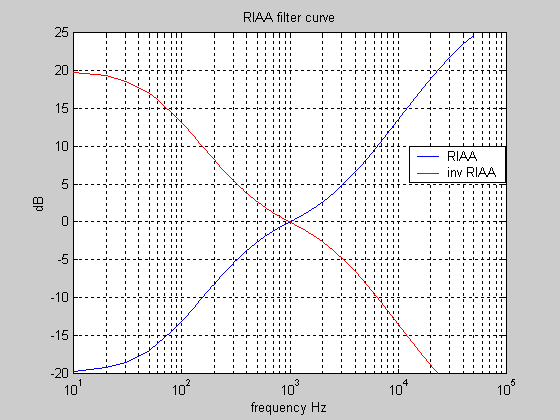RIAA filtering
RIAA equalization is a specification for the correct playback of vinyl records, established by the Recording Industry Association of America. The purpose of the equalization is to permit greater playback times, improve sound quality, and to limit the physical extremes that would otherwise arise from recording analogue records without such equalization. The RIAA equalization curve has operated as a de facto global industry standard for the recording and playback of vinyl records since 1954.
RIAA equalization is a form of preemphasis on recording, and deemphasis on playback. A record is cut with the low frequencies reduced and the high frequencies boosted, and on playback the opposite occurs. The result is a flat frequency response, but with noise such as hiss and clicks arising from the surface of the medium itself much attenuated. The other main benefit of the system is that low frequencies, which would otherwise cause the cutter to make large excursions when cutting a groove, are much reduced, so grooves are smaller and more can be fitted in a given surface area, yielding longer playback times. This also has the benefit of eliminating physical stresses on the playback stylus which might otherwise be hard to cope with, or cause unpleasant distortion.
The only drawback of the system is that rumble from the playback turntable's drive mechanism is greatly amplified, which means that players have to be carefully designed to avoid this.
RIAA equalization is not a simple low-pass filter. It carefully defines roll-off points in three places - 75ms, 318 ms and 3180ms, which correspond to 2122 Hz, 500 Hz and 50 Hz (the last being a high-pass to combat rumble).
WinAudioMLS implements the RIAA and inverse RIAA curves as a digital filter. These filters can be applied to the analyser and the signal generator. With the ability of WinAudioMLS to process .wav files you can perform RIAA pre-amplifier tests with real music signals.
The following picture shows the RIAA and inverse RIAA curve.
